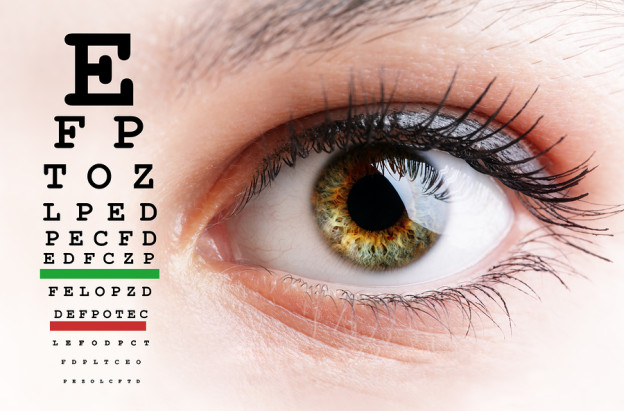By David Blyweiss, M.D., Advanced Natural Wellness
September 18, 2019
Your eyesight is one of your most important gifts. So when I see patients ignoring eye health, I like to set them right.
Think about it. Your eyesight is your key to independence. Once it starts to go, all sorts of things happen.
The most terrifying, of course, is losing your driver’s license. Suddenly you can’t go to the grocery store… you can’t get to the doctor if you have an emergency… you can’t even meet your friends for dinner.
You’re also likely to start limiting other activities… even ones as simple as putting away your clothes… because tripping and falling suddenly become big risks.
Now, the two nutrients you probably think of first when it comes to your eyesight are lutein and zeaxanthin. And it’s true that your eyes crave these two carotenoids.
A lack of them will slowly starve your macula. And when your eyes are constantly starved, it’s a serious threat to your long-term vision.
Open your arteries, improve blood flow for a new health miracle...
Did you know your circulatory system has over 60,000 miles of arteries, veins and other blood vessels, if stretched end to end?
But as you age, your blood vessels undergo changes, which may cause them to stiffen, thicken and get clogged.
GOOD NEWS! Doctors have now identified a “Miracle Molecule” inside your arteries that helps OPEN your arteries and IMPROVE blood flow.
It’s what Dr. Valentin Fuster calls it, "One of the most important discoveries in the history of cardiovascular medicine."To you, that means...
- Healthy blood pressure
- Sharper mind and memory
- Skyrocketing energy and muscular strength
- Increased pleasure and passion in the bedroom
- Improved circulation to every cell and organ in your body
Go here to discover a new natural way to significantly boost the levels of this miracle molecule in YOUR body NOW!
But despite popular belief, these carotenoids aren’t the only nutrients your eyes are hungry for.
Why Your Eyes need more than Lutein and Zeaxanthin
Every week, I take a trip to Whole Foods and leave with two or three bags of food filled with vision-saving nutrients. I usually stick to a mostly rainbow colored organic plant-based diet with some clean animal proteins included.
Now, before you remark about the price of organic foods, let me set you straight. The two bags of veggies and fruits only cost me about $25 or $30 versus the $40 I would spend back in the old days — when I was still eating a lot of unhealthy processed foods….
Each of these foods includes nutrients that will allow me to keep up my vision strength for years to come.
One of the first things you may find in my bags is wild caught fish, shellfish, or pastured meat or fowl. These products contain an amino acid called taurine. You might be surprised to learn that it’s the most abundant amino acid in the retina, lens, cornea and iris of your eyes.
More importantly, taurine protects specialized cells that send the images you see to your brain. If you suffer from vision problems, it could be because these cells aren’t getting the protection they need. Instead, they’re growing weaker and weaker.
Are You Suffering From...
- Love handles and a pot belly
- Romance that isn't what it used to
- Forgetfulness and inattention
- Low (or no) strength and endurance
- A sex drive that's shifted into neutral...or worse
If so...you may have Mature Male Burnout. Click here to discover more about this unique condition and what you can do about it.
Next, my weekly grocery trip includes pumpkin seeds, sesame seeds, cashews or lentils for a good source of zinc. Meat and lamb also contain zinc.
Zinc is another nutrient that probably doesn’t strike you as “eye-food.” After all, most people take zinc to fight off colds. But it’s also important to the health of the retina.
You see, when you’re short on zinc it makes it harder for your eyes to adjust to the dark. This makes it hard to see things when you go from a well-lit area into a room that’s much darker.
And I have to say. It frightens me to think about what could happen when someone with this condition drives from a brightly-lit road onto one with low-light conditions.
I’ll also purchase dark leafy greens like organic kale, turnip greens, collards, spinach and red chard to boost my lutein, zeaxanthin, vitamin A and vitamin C levels. Even simple ingredients like vitamins A, C and E can make the difference when it comes to preserving our eyesight or losing it.
Finally, I’ll be sure to include a solid source of Omega-3 fatty acids. They protect the nerve cells in the retina by shutting down oxidative stress, inflammation and abnormal blood vessel formation. Alpha lipoic acid protects the DNA in the cells in your eyes and helps boost oxygen delivery to the tiny capillaries responsible for blood flow.
In the end, if you want to protect your eyesight, it’s important to eat a wide variety of organic produce and clean animal proteins.
What to Feed Your Starving Eyes
This makes a Mediterranean style diet – rich in omega-3 fatty acids, fresh fruits and vegetables, beans and nuts – a perfect way to protect your eyesight.
However, because many of today’s foods don’t have the vitamin, mineral and nutrient content that it once did, it’s also a good idea to supplement with a top-quality eye formula that will support all of your vision needs.
Look for one that contains lutein, zeaxanthin and astaxanthin. But don’t stop there. Your starving eyes need much more than these two nutrients.
With that in mind, you’ll also want one that contains sight-saving taurine, zinc, omega-3 fatty acids, alpha lipoic acid and other eye supporting nutrients.
Remember… as you age, the sharpness of your vision can make the difference between the freedom of driving wherever you want to go… or being stuck at home and depending on others. So don’t take your eyesight for granted.
P.S. If you’re serious about maintaining your eyesight, independence and freedom, check out the super vision formula I helped the folks at UniScience create. It contains just the right dose of 16 must-have vision boosters to give you sharper and clearer vision.
SOURCES:
Ripps H, et al. Review: Taurine: A “very essential” amino acid. Mol Vis. 2012; 18: 2673–2686.
Froger N, et al. Taurine is a crucial factor to preserve retinal ganglion cell survival. Adv Exp Med Biol. 2013;775:69-83.
Ugarte M, et al. Iron, zinc, and copper in retinal physiology and disease. Surv Ophthalmol. 2013 Nov-Dec;58(6):585-609.
Rasmussen HM, et al. Nutrients for the aging eye. Clin Interv Aging. 2013; 8: 741–748.
Inman DM, et al. α-Lipoic Acid Antioxidant Treatment… Retinal Ganglion Cell Death and Dysfunction. PLoS One. 2013; 8(6): e65389.







